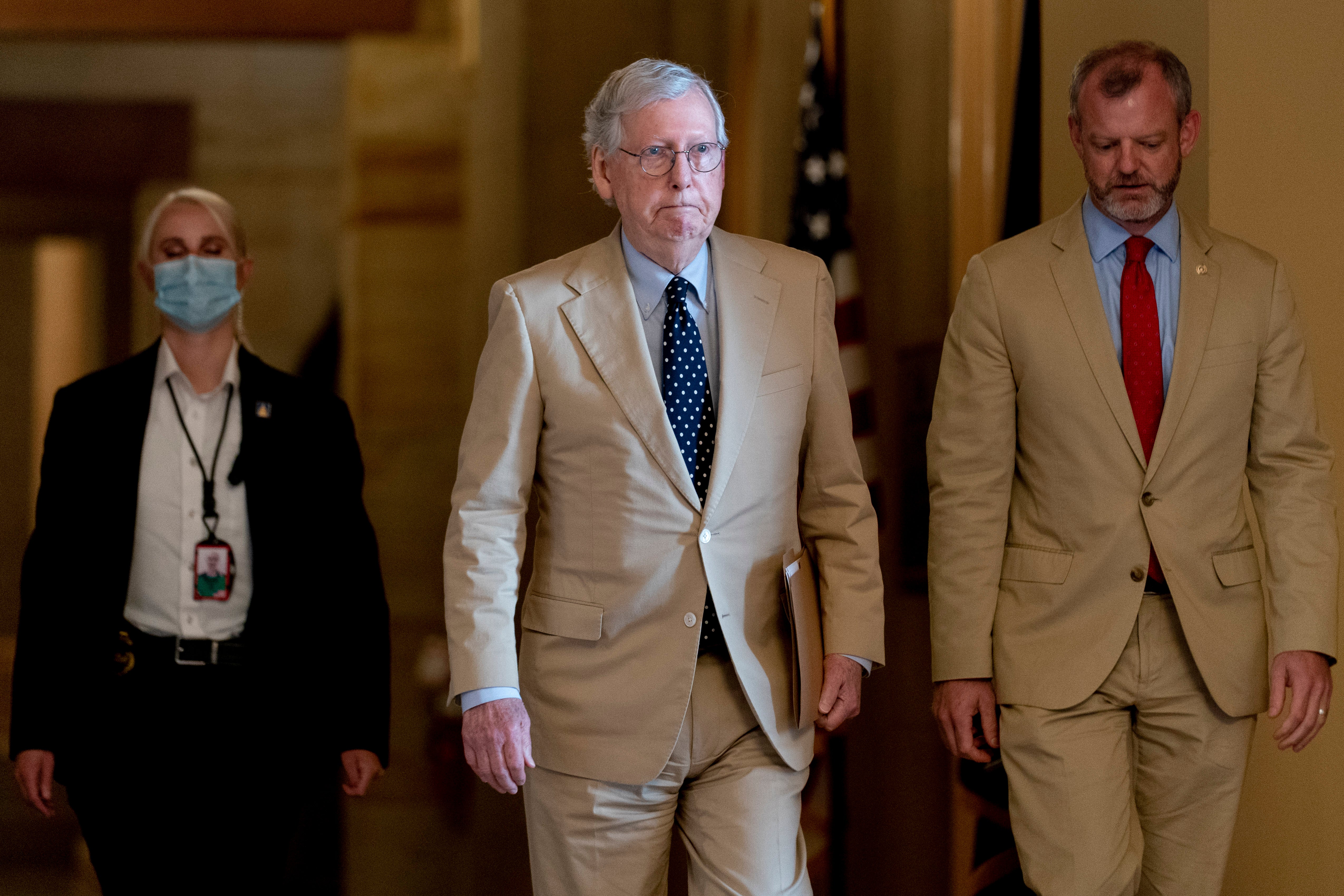Remember: Mitch McConnell didn’t help pass this infrastructure bill out of the goodness of his heart
Love his politics or hate them, you’ve got to say this for McConnell: He is the most consistent politician in Washington — a truly cold-blooded operator. And he knows what he stands to gain from this


With passage in the Senate on Tuesday of a once-in-a-generation bipartisan deal on infrastructure, Senate Majority Leader Mitch McConnell has made a head-to-head wager with President Joe Biden: that he can make cross-party cooperation work in Republicans’ favor.
This is a new tactic for McConnell, whose legislative legacy is founded upon his fierce partisan obstruction during the Obama years. The Kentucky Republican — the top dog in the Senate GOP for the last 14 years — minced no words in 2009 when he declared that his top priority would be to foil Barack Obama at every turn and limit him to one term.
More than a decade later, his message has barely changed. He openly encourages his supporters to view him as the “Grim Reaper” for Democratic legislation.
Love his politics or hate them, you’ve got to say this for McConnell: He is the most consistent politician in Washington — a truly cold-blooded operator.
Which is why his turn these last few weeks as a bipartisan pragmatist on this $1 trillion infrastructure package, a non-emergency economic behemoth, is so shocking.
But as always with McConnell, this too is a calculation.
First, striking a deal with Democrats on infrastructure sends a clear message that the two parties can forge bipartisan compromises without eliminating the Senate’s traditional 60-vote threshold for legislation, known as the filibuster rule. McConnell for years has warned Democrats not to dispense with that bipartisan tradition. “Bills that deserve to pass this chamber are not having a hard time passing it,” he said earlier this month.
Now that’s obviously a subjective summary of recent Senate history — one with which the Elizabeth Warrens and Bernie Sanderses of the world would certainly disagree — but the translation is that Democrats don’t need to change the rules to get what they want, they just need to be reasonable.
Second, the infrastructure deal provides a smokescreen for McConnell’s prevailingly obstructionist agenda.
Aside from the infrastructure package, McConnell largely has made good on his promise to be Biden’s Grim Reaper. Just over half a year into the president’s first term, McConnell and the Senate GOP have killed sweeping bills to reform policing in the US, protect voting rights, and establish a bipartisan commission to investigate the January 6 insurrection at the US Capitol.
They tried, unsuccessfully, to grind Democrats down to a crawl on Covid relief aid. And they are lightyears apart from Biden on anything related to the US immigration system.
But supporting the bipartisan infrastructure deal provides McConnell an endlessly exploitable talking-point for the next three years: “See,” the GOP leader can now credibly say, “we’re not just a party of obstruction — just look at all those wonderful infrastructure programs and projects we funded in 2021.”
For Biden, the infrastructure deal fulfills his campaign promise to be “an American president,” not just a president for the 51 per cent of the nation that voted for him last November. Throughout his 2020 campaign, he pitched himself as a pragmatic problem-solver, a “Senate guy” who would be able to leverage his institutional knowledge of the “World’s Greatest Deliberative Body” — where he spent 36 years, from 1973 to 2009 — to pass transformative legislation. He has been unequivocally successful in that regard so far.
Yet the bipartisan agreement poses potential problems for both men, risking alienating their respective parties’ fringes.
That problem is more pronounced for McConnell because the conservative “fringe” is not really a fringe at all after Donald Trump’s ideological takeover of the GOP; the so-called fringe is now the mainstream. Less than half of Senate Republicans voted in line with McConnell and all 50 Senate Democrats to move forward with the infrastructure proposal on Tuesday.
Trump began calling for McConnell’s ouster over the infrastructure negotiations back in June, weeks before a deal had even been reached. “You need better leadership at the Senate level,” the former president told Fox News’s Sean Hannity during a town hall-style event on June 30. “You need someone better than Mitch McConnell. Mitch McConnell can no longer do the job.”
Trump doubled down this past weekend, in a statement made through his super PAC that called the bipartisan infrastructure deal a “disgrace” and insisted Republicans had leverage for a better one. “If Mitch McConnell was smart, which we’ve seen no evidence of, he would use the debt ceiling card to negotiate a good infrastructure package,” Trump said.
Of course, Trump’s position on this — as with most things — is ludicrous. The former president and his supporters simply cannot fathom any compromise with the Democrats playing to their political advantage.
That obstinance often inhibited Trump’s own presidency. The government shut down twice during his four years in office as he demanded completely unrealistic concessions from both Democrats and Republicans on immigration and border security. He threatened to derail the annual military budget bill last year over a provision to rename bases named for Confederate traitors. And he resisted making Juneteenth a federal holiday despite overwhelming support for that initiative, an ugly display of ego and base-pandering that sent conservative culture warriors sharpening their pitchforks.
Every single one of those episodes was as avoidable as it was repugnant.
In perhaps his biggest break from Trump since the former president ascended to the presidency in 2017, McConnell is digging in his heels on the infrastructure package. He has apparently determined that preserving some form of bipartisan cooperation in the Senate is more important in the long run than Trump’s short-term threats to endorse primary challengers against any Republican who votes for it.
“There is an excellent chance it will be a bipartisan success story for the country,” McConnell said of the package last week.
Now the package heads to the House, where Nancy Pelosi has a narrow margin for error to squeak it past a united GOP minority.
Join our commenting forum
Join thought-provoking conversations, follow other Independent readers and see their replies
Comments
Bookmark popover
Removed from bookmarks